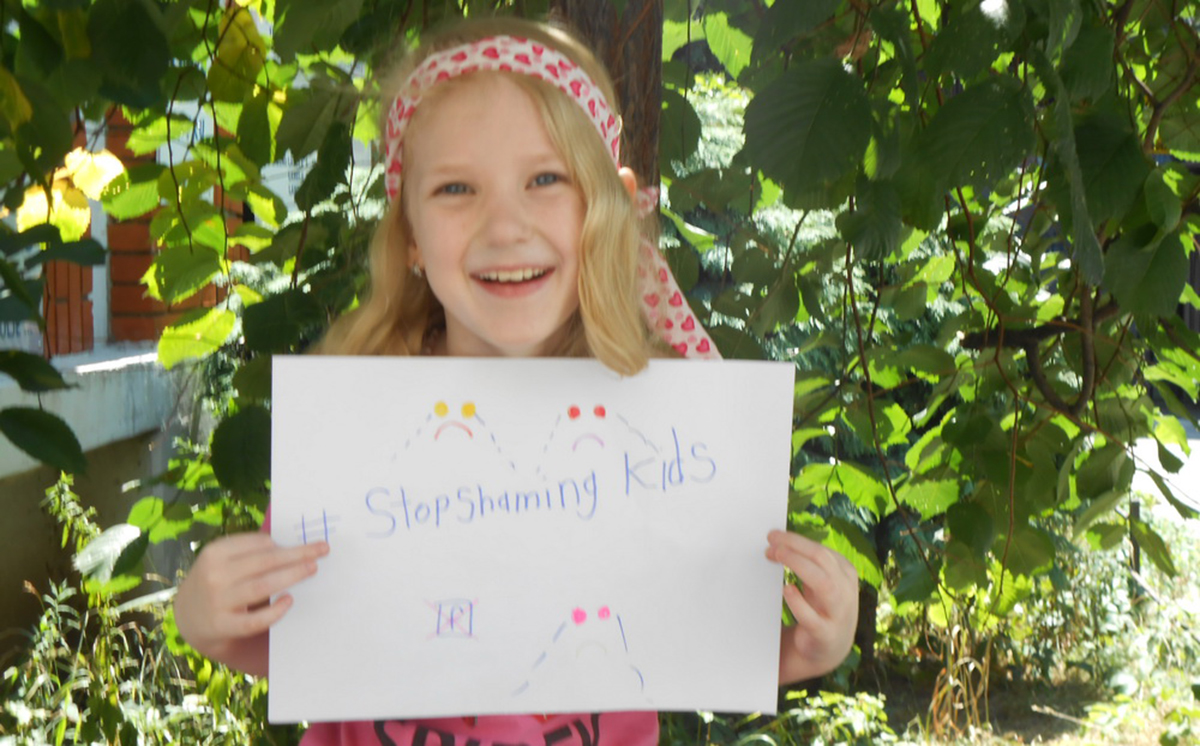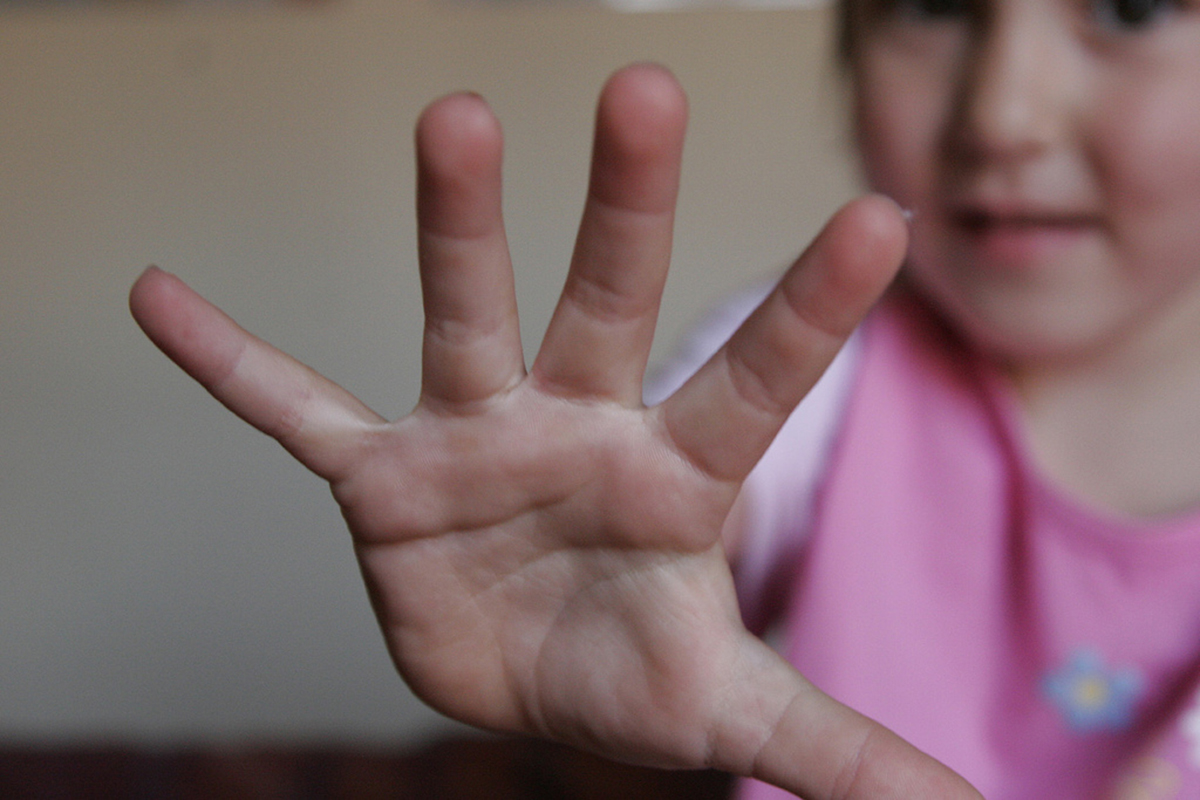Using shame and humiliation as a "parenting technique" is nothing new — we've all seen dunce caps and sandwich boards before — but our favorite modern technology, the internet, has allowed punishments that assault kids' basic human dignity to go global.
My first encounter with parents who take to the web to shame their children publicly came in the form of that now infamous video in which a dad shot his teen daughter's laptop because she complained about him online, back in 2012. Her life, he bitterly yelled into the camera, was about to get a whole lot harder.

Since that video appeared, it seems, similar messages have been flooding the internet. They come in different forms — parents making their kids hold heavy stacks of books on camera as a punishment for stealing, parents cutting kids' hair off for bringing home bad grades, and yes, parents making their kids put soap or hot sauce in their mouths because they didn't like what their children said.
Photos in which children hold signs detailing their "crimes" appear to be most popular, however. A quick Google image search offers examples:
- "I stuck my hands in ketchup and used my mom's skirt to wipe it off."
- "I threw up in my new car seat the very first time I sat in it."
- "I lie, steal and sell drugs."
- "I don't follow the law."
- "I am a bully. Honk if you hate bullies."
- "I am a self-entitled teenager with no respect for authority."
- "I was suspended from school for cussing out my teacher."
- "I can look you in the eye and tell a blatant lie." That one was a sign held by a toddler.
No, Shame Isn't A Legitimate Parenting Technique
Just what happens when we shame people for behavior we consider to be undesirable, rather than working on solutions together? I pulled up a random internet page that explains why managers should not use shame and humiliation to redirect their employees. Shame, this random page — linked in the sources box below — said, can lead some people to react with acts of defiance, while others withdraw, lash out, or become defensive. Some react to being shamed by trying to perpetually please others, but internally feeling like they are never good enough.
Then, it goes on to describe how employers and employees can reach solutions together, in a way that maintains the human dignity of everyone involved.
Why do I refer to the first page that came up when I searched "why shaming people in the workplace doesn't work", you may wonder? I'll tell you why: because there is absolutely nothing controversial about saying that no good boss should humiliate their employees when they underperform. Do it anyway, and such a boss would be considered a jerk at best, and be in court for workplace harassment at worst.
READ Parenting: So If You Don't Spank, What Do You Do Instead?
While there's no doubt that many people treat others badly, the only person you can consistently get away with treating with shame and humiliation is your own child — and the only person you can legally hit in the United States is your child. It's almost like society doesn't see children as people at all. And that has to stop.
Let's Turn The Tide And Fight To Stop Shaming Kids
Thankfully, not everyone is so eager to jump on the social-media shaming bandwagon. Just recently, Florida father of four Wayman Gresham uploaded what appeared to be yet another child-shaming video. The electric razor, the son sitting on a chair with his head bowed, and the opening words "I'm going to teach my son a lesson" seemed to tell it all. Until, that is, he said: "Wait a minute. Come here boy, give me a hug."
"There's no way in the world I would ever embarrass my son like that," Gresham went on to tell his 20 million + viewers. "It doesn't take all that. Good parenting starts before he even gets to the point of being out of control."

In a powerful video explaining why shaming is no different from other forms of abuse, and certainly no way to raise emotionally-healthy and happy children, they urge Facebook to amend its user agreement to ban adult bullying. That shouldn't be too difficult, should it? Facebook already says it's committed to making sure people are free from acts of hate and harassment on their platform, after all. You, too, can add your voice to their campaign by signing their petition to help make internet shaming a thing of the past.
SteadyHealth spoke to one of the campaign's founders, Lori Petro. She told us: "Our mission is to stop the public shaming of children on social media, bring awareness to the detrimental effects of shaming, and to provide parents and all people who work with children alternatives to shame-based parenting. We can stop shaming and hurting our children, and instead teach through love because parenting beyond punishment is possible. "
- Photo by Olivia Maloy/SteadyHealth
- Photo courtesy of Phineas H via Flickr: www.flickr.com/photos/phinworld/124296573
- Photo by Olivia Maloy/SteadyHealth
- Here's the petition: www.thepetitionsite.com/102/838/621/stop-shaming-kids/
- www.teach-through-love.com/stop-shaming-kids.html
- www.workplacestrategiesformentalhealth.com/pdf/Blame_and_shame.pdf
- jezebel.com/13-year-old-girl-dies-by-suicide-after-dad-shares-publi-1708967488
- www.bbc.com/news/blogs-trending-33023129

